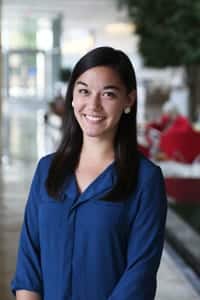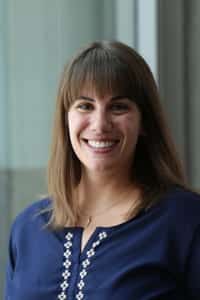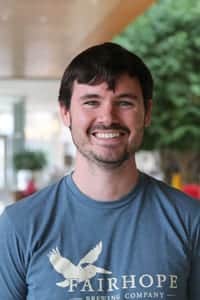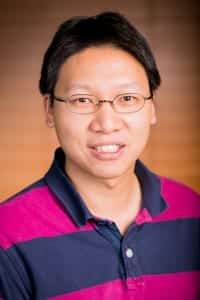At the start of this new year, we wanted to highlight the careers of some alumni that have come through the Morgridge Institute.
A few of our Morgridge alumni shared thoughts on their research experience at the institute, their plans moving forward and their warm shoutouts to some of the people who helped them along the way.
Tiffany Heaster
Skala Lab

Heaster worked in the Skala lab where she was involved in characterizing metabolic autofluorescence as a biomarker of the immune response in cancer.
“This experience built my expertise in imaging technologies and various ways imaging was being used to study cell behavior across disease areas, which has largely helped me in guiding project directions and designing experiments here at Genentech,” says Heaster.
Currently, Heaster is working as a senior scientific researcher at Genentech where she focuses on the discovery and validation of new imaging biomarkers for cancer, ophthalmologic and neurological diseases.
Shoutout: Dan Gil, Amani Gillette, and Rupsa Datta. “Both my lab and Morgridge were great support for my accomplishments, so I don’t think I could attribute it to a single individual,” says Heaster. “But I’d definitely have to shout out Dan Gil, Amani Gillette, and Rupsa Datta for always being there to provide feedback or brainstorm ideas, but also being a big part of my life outside of science.”
Ellen Dobson
Fab Lab (Eliceiri Lab)

Dobson is currently working as an assistant scientist in image processing and analysis at UW–Madison’s Laboratory for Optical and Computational Instrumentation (LOCI). As a member of the ImageJ team, Dobson plays a key role in training new ImageJ users, assisting them with their image analysis workflows, as well as running regular training workshops.
“I am a trained microbiologist. Without my experience as a Morgridge postdoc, I never would have been able to transition to the world of bioimage analysis—especially so seamlessly,” says Dobson. “It is not often that scientists are fully supported in their goals of gaining expertise in fields beyond their original fields.”
Shoutout: Kevin Eliceiri. “He was nothing but supportive of me from the start and has continued to be,” says Dobson. “It is such a rare thing to find a boss like Kevin— he’s one of the most kind, thoughtful, and supportive bosses I’ve ever had and will most likely ever have! I have learned so much from him—not just about science and collaboration, but also the importance of work-life balance. He is a true gem!”
Peter Favreau
Skala Lab

Favreau is currently serving as the director of the Biochemistry Optical Core (BOC), part of the UW–Madison Department of Biochemistry core facilities network. In this role, Favreau trains new users, performs microscope maintenance, requests new equipment and oversees outreach efforts on behalf of the core. COVID-19 has altered these responsibilities somewhat, but the central goal of the BOC remains the same: to be a center for state-of-the-art microscopy available to any UW–Madison student or faculty, as well as a resource for the greater Madison research community.
“The outreach opportunities Morgridge provides for its researchers gave me the tools and confidence I needed to be a good science communicator,” says Favreau. “Working with so many world-class researchers also gave me a model for well-organized, thoughtful research, which has helped me better assist users of the BOC. The collaborations I fostered in my time with Morgridge continue to form the foundation of my professional network in my current role. Morgridge has been an incredible opportunity to further my development as a scientist and a member of the research community.”
Shoutout: Melissa Skala. “Her ability to work with countless researchers across campus gave me a model for interacting with scientists in my own career, and her lab’s collaborations offered me first-hand experience working with scientists in an interdisciplinary environment,” says Favreau.
Alex Walsh
Skala Lab

Walsh is currently working as an assistant professor of biomedical engineering at Texas A&M University where she teaches a few of the department’s instrumentation-track courses. She building a research program that focuses on optical microscopy and quantitative image analysis.
“I was only at Morgridge a few years, my work there provided a nice bridge between my post-doctoral fellowship and my current position,” says Walsh. “I was fortunate for the opportunity to mentor several junior researchers and that experience was helpful now that I am leading a research team.
Shoutout: “I worked with so many fantastic engineers and scientists that it is not possible to recognize just one. Certainly, Professor Skala for her guidance and mentorship, and the team I worked with every day: Kelsey Tweed, Isabel Jones, Rebecca Schmidt, and my desk buddy, Dr. Rupsa Datta,” says Walsh.
Li-Fang (Jack) Chu
Thomson Lab

Chu currently works for the Department of Comparative Biology and Experimental Medicine as a tenure-track assistant professor as part of the faculty of veterinary medicine at the University of Calgary. His research interests focus on using pluripotent stem cells to model development and disease, and to identify novel therapeutic strategies for regenerative medicine.
“My training in James Thomson’s lab, equipped me with the knowledge and skillsets required for a successful academic career,” says Chu. “Also, the interdisciplinary collaborations across Morgridge and UW were instrumental for me to pursue challenging research projects, and opened up further opportunities for me.”
Shoutout: James Thomson. “He provided a nurturing and collaborative environment which helped me grow into an independent scientist,” says Chu. “I hope to cultivating the same inspiring environment in my own lab and foster the next generation of scientists.”
